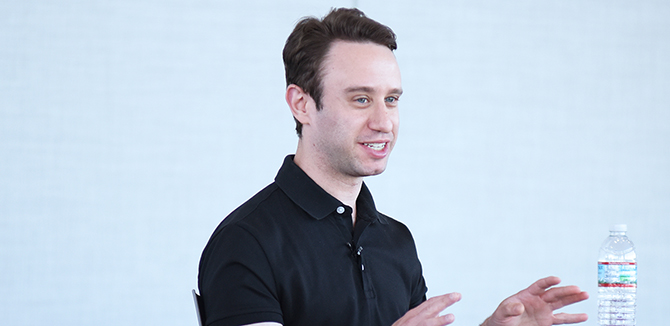Valuable Advice about Venture Capital
Michael Schultz shared his insights as a venture capitalist with students and alumni from Northwestern Engineering's Master of Biotechnology Program (MBP).

Michael Schultz knows what he’s looking for in a biotech startup company.
Schultz is the director of venture operations at Portal Innovations, a life-science venture capital firm that seeks to find biotech companies with the potential to change the future of healthcare.
He shared his search criteria and his view on the role of venture capital with students at Biotech Nexus, an annual event hosted by Northwestern Engineering's Master of Biotechnology Program (MBP).
“Venture capital is very important in biotech and medtech because these are very risky companies,” he said. “Only a small portion of them will succeed well enough to return the investment.”
Roughly 90 percent of new drugs fail during the development process, according to the American Society for Biochemistry and Molecular Biology (ASBMB), and a similar percentage of biotech startups go under each year. That makes finding the winners a challenging but potentially lucrative job.
Schultz has been doing that job at Portal for more than three years. He started as a venture analyst in September 2021 and was promoted to director in November 2023.
He focuses on what he called “three big buckets” as he seeks to separate the diamonds from the rough.
“The first is the market. Is there a demand for what this company is trying to do?” he said. “The second is the technology itself. How much evidence do they have on their science? How risky is this new drug or medical device they're trying to build?”
The third is often more subjective — the makeup and constitution of the company’s team. Schultz said he seeks to get to the heart of the founders’ motivation, experience, and surrounding support system.
If Schultz and his colleagues find what they believe to be a potential winner, the company provides resources to help nurture it toward success.
Some of that support comes through financing. It takes 10 to 15 years and roughly $1 billion, on average, to develop one successful new drug in the United States, according to ASBMB. That makes sustained cashflow a key component to creating potentially lifesaving pharmaceuticals.
But that’s not all a startup biotech company needs. Portal provides lab and office space to the companies in which it invests. More than that, it offers a community of support and a pipeline of bright minds.
“We hold lots of events. We have partnerships with other investors and pharmaceutical companies,” Schultz said. “Our programs link companies to employees, and we have over 40 companies in our Chicago space alone.”
Schultz shared this insight with MBP students at Biotech Nexus.The event featured a panel discussion with industry professionals who leverage biotechnology in a variety of ways, followed by a networking cocktail reception where MBP students interacted and connected with panelists and other industry attendees.
MBP is an ideal place to birth a startup because of the number of resources available to students with their sights set on major medical breakthroughs, he said. For those students who think they are ready to talk with someone about venture capital, Schultz offered valuable wisdom.
“If you're looking for money, ask for advice,” he said. “It's good to approach potential investors even before you're ready to start fundraising. If you go to them and say on the first interaction, ‘Are you ready to invest?’ you’re not going to get that check. Start by building relationships and asking for advice.”

